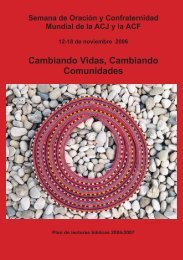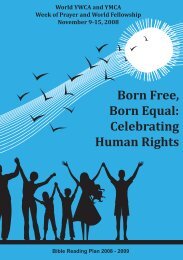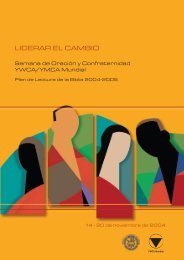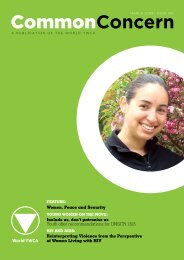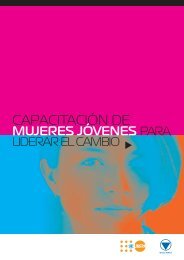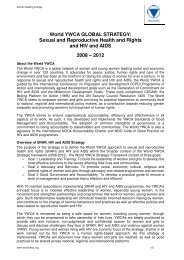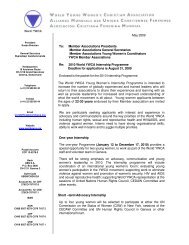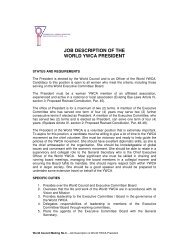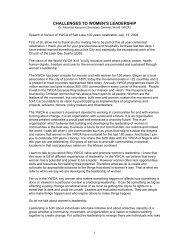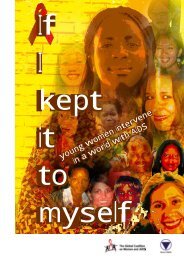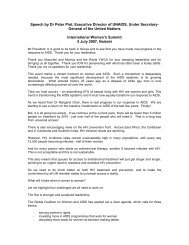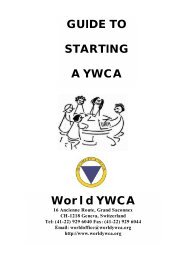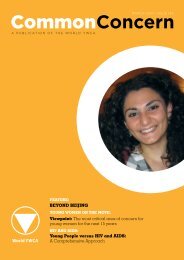World YWCA Let s talk about sex.pdf
World YWCA Let s talk about sex.pdf
World YWCA Let s talk about sex.pdf
You also want an ePaper? Increase the reach of your titles
YUMPU automatically turns print PDFs into web optimized ePapers that Google loves.
feature<br />
CC 7<br />
The International Conference<br />
on Population and<br />
Development (ICPD) held<br />
in Cairo in 1994, hosted by<br />
the United Nations, brought together<br />
governments, inter-governmental<br />
agencies, world leaders, civil society<br />
and activists to discuss the link<br />
between population and development,<br />
specifically women’s role in alleviating<br />
poverty. During the conference, it was<br />
made clear that until women and girls<br />
have full enjoyment of their rights, in<br />
family life and society, the development<br />
of communities and countries would be<br />
held back. The conference concluded<br />
with a Programme of Action (PoA) that<br />
outlined key areas for governments<br />
and world leaders to address in<br />
order to ensure women and girls can<br />
live full and fulfilling lives. The goals<br />
include commitments on increasing<br />
access to education for women and<br />
girls, reducing child and maternal<br />
mortality and ensuring women’s<br />
health, especially their <strong>sex</strong>ual and<br />
reproductive health.<br />
The ICPD set a target for the<br />
PoA—governments are to achieve the<br />
goals by 2015. With less than five years<br />
to go, the world is far from reaching the<br />
ambitious goals set in the PoA. Women<br />
still die needlessly from childbirth<br />
complications, young women lag<br />
behind their male peers in education<br />
and far too many girls entering their<br />
reproductive years face numerous<br />
dangers from violence to HIV, early<br />
marriage to risk of cervical and breast<br />
cancer.<br />
Reproductive health and<br />
rights<br />
The outcomes of the ICPD offer<br />
the most comprehensive definitions of<br />
<strong>sex</strong>ual and reproductive health and<br />
rights (SRHR). Although some theories<br />
on SRHR remain contentious, the<br />
definitions set at the ICPD have gone<br />
on to inform the work of countless<br />
organisations, including the <strong>World</strong><br />
<strong>YWCA</strong>.<br />
In 2003, the <strong>World</strong> <strong>YWCA</strong> Council<br />
adopted a resolution on Reproductive<br />
Health and Sexuality calling on the<br />
<strong>YWCA</strong> movement to promote and work<br />
towards the provision of extensive<br />
access to quality education, resources,<br />
information, discussion and counseling<br />
for women and girls regarding their<br />
reproductive rights.<br />
Many <strong>YWCA</strong>s have implemented<br />
programmes on reproductive health<br />
like the acclaimed <strong>YWCA</strong> Encore<br />
Breast Cancer programmes available<br />
across the USA, Australia, New<br />
Zealand and Japan that provide women<br />
with support as they recover from<br />
breast cancer surgery.<br />
In Ghana, the <strong>YWCA</strong> run<br />
reproductive health services that<br />
reached over 60,000 schoolgirls and<br />
women of reproductive-age through<br />
mobile health clinics funded by the<br />
Centre for Development and Population<br />
Activities (Cedpa).<br />
Violence, HIV and the link<br />
to <strong>sex</strong>ual rights<br />
Sexual rights protect women and<br />
men’s right to decide when, where,<br />
how and with whom they choose to<br />
have <strong>sex</strong>ual experiences. Furthermore,<br />
people—including young people<br />
—have the right to all information on<br />
the importance of responsible <strong>sex</strong>ual<br />
behaviour and how to effectively<br />
prevent <strong>sex</strong>ually transmitted infections<br />
(STIs) and HIV.<br />
But <strong>talk</strong>ing <strong>about</strong> <strong>sex</strong> with a partner<br />
can have serious consequences<br />
for many women—whether it is a<br />
discussion on how many children<br />
to have, introducing condoms to<br />
the relationship or declining <strong>sex</strong>.<br />
Simply trying to access <strong>sex</strong>ual rights<br />
in a context of harmful traditions or<br />
legislation that do not protect women<br />
often increases their vulnerability<br />
to violence and HIV infection. There<br />
are many forms of violence against<br />
women (VAW) and there is no fixed,<br />
exhaustive list. VAW includes violence<br />
in the family and community such as<br />
battering, marital rape and emotional<br />
abuse like isolation and humiliation.<br />
The ICPD defined reproductive health as:<br />
“…a state of complete physical, mental and social well-being<br />
in all matters relating to the reproductive system and to its<br />
functions and processes. It implies that people have the<br />
capability to reproduce and the freedom to decide if, when<br />
and how often to do so. Implicit in this is the right of men and<br />
women to be informed and to have access to safe, effective,<br />
affordable and acceptable methods of family planning of their<br />
choice, as well as other methods of their choice for regulation<br />
of fertility, which are not against the law, and the right of<br />
access to health-care services that will enable women to go<br />
safely through pregnancy and childbirth.” 1<br />
1 United Nations Department of Public Information * DPI/1618/POP--March 1995<br />
It also includes harmful traditional<br />
practices like female genital mutilation,<br />
child and forced marriage, forced<br />
<strong>sex</strong>ual initiation, acid throwing, <strong>sex</strong>ual<br />
harassment and intimidation at work<br />
or schools, trafficking and forced<br />
sterilisation. 1<br />
In 2007, the <strong>World</strong> <strong>YWCA</strong> further<br />
committed to advancing women’s<br />
rights by including actions on SRHR<br />
in the Nairobi 2007 Call to Action<br />
on HIV and AIDS launched at the<br />
International Women’s Summit on<br />
Women’s Leadership on HIV and AIDS 2 .<br />
In regions where the HIV prevalence<br />
1 1993 UN General Assembly Declaration on the<br />
Elimination of Violence against Women<br />
2 Hosted by the <strong>YWCA</strong> the International Women’s<br />
Summit on Women’s Leadership on HIV and AIDS<br />
was the first international conference to focus on<br />
women’s leadership and HIV and AIDS<br />
www.worldywca.org



